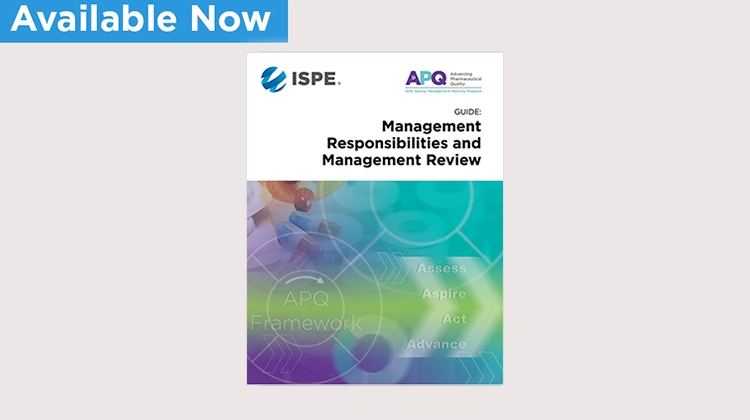ISPEs Advancing Pharmaceutical Quality (APQ) program recently launched its latest guide, Management Responsibilities and Management Review with the objective of helping leaders succeed in building strong quality cultures. The APQ program is built on the foundation of ICH Q10.
ICH Q10 [R1] sets a clear expectation regarding the role of strong leadership for demonstrating and communicating “strong and visible support for the pharmaceutical quality system (PQS).” This includes an ongoing commitment to quality across the organization and the proactive review of the performance of the PQS. The objectives of high quality and continuity of supply are central to the Management Responsibilities and Management Review (MRR) principles and processes.
1. What is the benefit of a robust Management Responsibilities and Management Review program?
Greer: Implementing an effective ManagementResponsibilities and Management Review program not only increases the reliability of supply for quality products but also offers routes to delivering sustainable, competitive advantage for the organization. As leadership consultant Henry Cloud states, “The culture of an organization is what leaders create and allow.” MRR helps leaders create the culture they want to win with patients and in the marketplace.
Grischeau: Most leaders of pharmaceutical organizations are committed to quality but determining how that commitment positions the organization for success in achieving and sustaining Cultural Excellence can be difficult. Most scorecards do not include metrics focused on leadership effectiveness so drift can occur without warning signs and the results can be significant: drug shortages, enforcement actions, recalls, dissatisfied patients/consumers, and disengaged organizations.
2. How can establishing a MRR program now help companies in the future?
Grischeau: The FDA is advancing it’s thinking around Quality Management Maturity (QMM) as a “state attained by having consistent, reliable, and robust business processes to achieve quality objectives and promote continual improvement.” Establishing a MRR program helps companies set a baseline and provides a mechanism for leadership to proactively assess areas that need improvement. Additionally, the MRR program aligns well with the FDA’s thought process by building on ICH Q10 principles as a holistic approach to Pharmaceutical Quality System effectiveness.
The FDA has leveraged industry input, including efforts from the ISPE APQ Program, to build upon their own QMM Pilot Programs. The ISQE APQ team and FDA continue to collaborate and share knowledge to shape the development of future maturity programs. Leveraging ISPEs APQ guides can help companies prepare for the upcoming QMM program.
3. How can companies develop a MRR program?
Grischeau: The ISPE APQ Guide: Management Responsibilities and Management Review guides users through the steps of the MRR guide framework including how to apply the MRR model and method – from assessment of current state through evaluation of improvement actions – truly leveraging a closed loop model. The complementary resources found in the Guide assist with pre and post assessment activities, and the case study provides real-world scenarios to walk readers through an example of the assessment process and report out. The guide team wrote the case study for companies of varying maturity and production scale, so start-ups to established firms can apply the methodology to assess against the MRR concepts.
Greer: The Guide also builds upon the foundation of ICH Q10 and adds other key leadership components such as creating a strong patient/consumer focus and establishing systems and staff for external surveillance, engagement, and benchmarking. The Guide provides a practical tool for organizations that want to assess and strengthen their leadership systems to support their pursuit of Cultural Excellence and ultimately create more value for their patients, shareholders, and employees.
About APQ
ISPE’s Advancing Pharmaceutical Quality (APQ) program proposes an industry-led approach to advance pharmaceutical quality beyond the submission of data for harmonized, reportable metrics. The basic framework of the program is to “assess and aspire” quality maturity. The program is aligned with international initiatives that promote quality excellence, as well as with the FDA’s interest in quality management maturity and rating the maturity of manufacturing facilities, as cited in their 2019 Drug Shortages report. The result is a program that organizations can leverage to ensure a continuous supply of quality medicines to patients.
The APQ Guide Series provides a practical set of tools and systematic approaches for organizations to proactively advance the maturity and effectiveness of the following PQS elements:
- Corrective and Preventive Action System
- Management Responsibilities and Management Review
- Change Management System
- Process Performance and Product Quality Monitoring System
The ISPE APQ Guide: Management Responsibilities and Management Review focuses specifically on application of the APQ framework to leadership systems.
Learn More!

.jpg)




